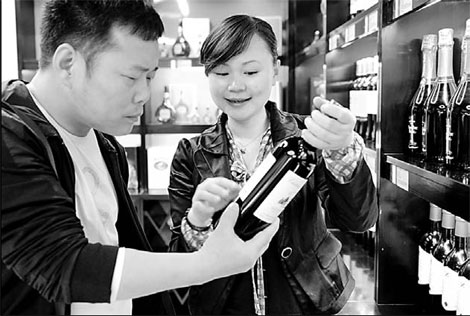People with a nose for profits look to red wine
Updated: 2011-11-07 07:50
By Tang Zhihao (China Daily)
|
|||||||||
|
A saleswoman shows a bottle of French wine to a businessman at a shop in Yiwu, Zhejiang province. Zhang Jiancheng / For China Daily |
SHANGHAI - Drinking and investing in red wine in China is booming but experts say those who want to make money from it should take a long-term view.
Figures from A.T. Kearney (ATK), a consulting firm in the United States, suggest that revenue generated from wine sales in China reached about 53 billion yuan ($8.28 billion) in 2009, benefiting from increasing wine awareness and rising health consciousness. ATK pointed out that growth in both volume and value has been 15 percent or better on an annual basis over the past few years.
Howard Abe, who specializes in consumer goods and retail practice at ATK, said the red wine business in China has a bright outlook with a compound annual growth rate of 12.2 percent from 2010 to 2015.
"Wine has become a symbol of a desirable urban lifestyle, which shows sophistication, vitality and social status," said Abe. "Many people buy wine as gifts for others, which further promotes the wine culture in China."
Abe said place of origin is one of the most important factors in deciding the value of a bottle of wine for the Chinese.
"French wine leads the imports with a 50 percent volume share and its share is still growing, given its reputation and long history," said Abe.
Increasing demand is pushing the price of wine to historical highs. For instance, a 2008 bottle of Lafite sold for 2,550 yuan when it was first released to the market. It now trades at about 12,620 yuan, an increased of about 500 percent in just three years.
It was estimated by Shanghai Wine Exchange Center (SWEC) that the return for luxury wine investments is about 30 percent annually. To put it into context, the return on gold investments is not so optimistic this year.
SWEC was the first wine-trading center formally established in Shanghai. It launched in September and allows investors to trade wine online. Wang Jiaqi, market development manager at SWEC, said some 2,000 investors have opened accounts with it.
SWEC suggested that wine from five famous vineyards including Chateau Lafite Rothschild and Chateau Tertre Roteboeuf are most preferred by the Chinese, and reported the most significant price hikes over the past few years.
Although wine drinking is popular, the wine culture in China remains unsophisticated. Industry experts said Chinese investors and consumers might not be able to fully distinguish good from bad wine.
"Most Chinese consumers have no idea about the intrinsic value of red wine. They pay more attention to the place of origin, year of production and brand because those elements can reflect the value of wine directly," said Zhou Siran, a food industry analyst with CI Consulting.
Just as luxury white spirits, or baijiu, is favored at business banquets, so now is red wine. However, compared with baijiu, the brand recognition of red wine is much lower.
"I treated a friend to a bottle of Lafite at a banquet but he did not identify it as Lafite initially. He liked the taste and asked me to buy two boxes of wine for him," said a Shanghai businessman who did not want his name published. "When he discovered the price, he was surprised and changed his mind about buying them".
As the wine investment business continues to develop, especially at a time of high inflation when every householder is seeking ways to prevent their wealth from shrinking significantly, experts are warning of the need to ensure they manage their risks.
Zhou said investors should be careful in investing in red wine because a bubble might be developing in the market.
"The investment protection mechanism in China is not sophisticated and investors lack the knowledge to identify the quality of wine. Many people just follow others with the hope of making a quick profit. It is not easy to manage the risk," said Zhou.
Abe from ATK also suggested investors should take a long-term view on returns.
China Daily












